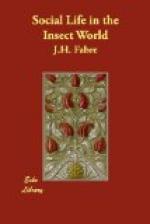The insect emphatically informs us that with us the haricot is of recent date. It has come to us from a distant country: and assuredly from the New World. Every edible vegetable attracts its consumers. If it had originated in the Old World the haricot would have had its licensed consumers, as have the pea, the lentil, and the broad bean. The smallest leguminous seed, if barely bigger than a pin’s head, nourishes its weevil; a dwarf which patiently nibbles it and excavates a dwelling; but the plump, delicious haricot is spared.
This astonishing immunity can have only one explanation: like the potato and the maize-plant, the haricot is a gift of the New World. It arrived in Europe without the company of the insect which exploits it in its native country; it has found in our fields another world of insects, which have despised it because they did not know it. Similarly the potato and the ear of maize are untouched in France unless their American consumers are accidentally imported with them.
The verdict of the insect is confirmed by the negative testimony of the ancient classics; the haricot never appears on the table of the Greek or Roman peasant. In the second Eclogue of Virgil Thestylis prepares the repast of the harvesters:—
Thestylis et rapido fessis messoribus
aestu
Allia serpyllumque herbas contundit olentes.
This mixture is the equivalent of the aioli, dear to the Provencal palate. It sounds very well in verse, but is not very substantial. On such an occasion men would look for that fundamental dish, the plate of red haricots, seasoned with chopped onions. All in good time; this at least would ballast the stomach. Thus refreshed in the open air, listening to the song of the cigales, the gang of harvesters would take their mid-day rest and gently digest their meal in the shadows of the sheaves. Our modern Thestylis, differing little from her classic sister, would take good care not to forget the gounflo-gus, that economical resource of large appetites. The Thestylis of the past did not think of providing it because she did not know it.
The same author shows us Tityrus offering a night’s hospitality to his friend Meliboeus, who has been driven from his property by the soldiers of Octavius, and goes limping behind his flock of goats. We shall have, says Tityrus, chestnuts, cheese, and fruits. History does not say if Meliboeus allowed himself to be tempted. It is a pity; for during the frugal meal we might have learned in a more explicit fashion that the shepherds of the ancient world were not acquainted with the haricot.
Ovid tells us, in a delightful passage, of the manner in which Philemon and Baucis received the gods unawares as guests in their humble cottage. On the three-legged table, which was levelled by means of a potsherd under one of the legs, they served cabbage soup, rusty bacon, eggs poached for a minute in the hot cinders, cornel-berries pickled in brine, honey, and fruits. In this rustic abundance one dish was lacking; an essential dish, which the Baucis of our countryside would never forget. After bacon soup would follow the obligatory plate of haricots. Why did Ovid, so prodigal of detail, neglect to mention a dish so appropriate to the occasion? The reply is the same as before: because he did not know of it.




